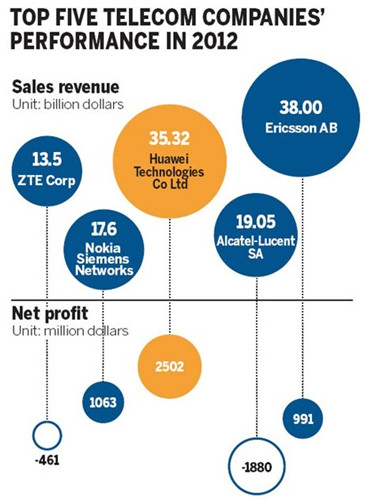
Media debut
Ren, 69, had never previously spoken to any media on the record, but he gave his first-ever news briefing to four New Zealand media representatives in Wellington in early May.
It came after New Zealand's biggest telephone company, Telecom Corp, awarded Huawei a contract to build its new nationwide wireless network. Huawei was also chosen as a core supplier in 2011/2012 for New Zealand's ultra-fast broadband initiative.
"New Zealand is one of Huawei's most important strategic markets and is very valuable to us," said Ren in a statement.
Huawei entered New Zealand in 2005 and now employs 120 people there.
Ada Qin, a senior editor at Forbes China, said when Huawei encountered severe opposition after bidding for contracts in the United States and in Australia, New Zealand's support meant a lot to the company.
In 2012, Australia cited national interest concerns when it banned a Huawei unit from tendering for contracts linked to the nation's A$36 billion ($38 billion) broadband network.
"The South Pacific region contributes a small share of sales to Huawei but it is critical in Huawei's fight against US opposition," Qin wrote in a Chinese analysis article.
According to Huawei's 2012 annual financial report, the Chinese and European markets accounted for about two-thirds of Huawei's total revenues. Huawei has developed relatively stable cooperation with these markets.
However, the US influence is powerful and imposes pressure on other swaying countries. The South Pacific market is targeted by US influence, Qin said. "The Australian market is important to Huawei's global ambitions. If Huawei gives up there, it may be a very damaging situation for the company."
Ren frequently turns down interview requests, both at home and abroad. His low-profile approach make many suspicious about him and his company. Given his Chinese military background, US politicians, among others, often cite Huawei as a possible threat to national security.
In 2010, the then US commerce secretary Gary Locke warned Sprint Nextel Corp against awarding Huawei part of a contract worth billions of dollars. Locke called Sprint CEO Dan Hesse directly to remind him of the US government's security concerns, according to a report in The Wall Street Journal.
The latest obstacles faced by Huawei include a US Congressional report last year that said Huawei and ZTE Corp, another Chinese telecom infrastructure provider, posed a threat to the country, citing concerns that their equipment might be used to spy on the US. Both companies strongly denied the allegations.
In Europe, meanwhile, the European Commission has been considering whether to start an investigation into allegedly unfair trade practices by Chinese companies including Huawei. Because of this, Huawei has been barred from doing business with major US telecom carriers.
As a result of these setbacks Ren appears to have realized Huawei has to be more open to win trust and erase any misunderstandings.
In internal conversations, Ren said he was not used to talking to journalists but he encouraged his management team to conduct interviews. The New Zealand media response, however, was an indication that he was prepared to make more of a personal effort.
Ren does not avoid sensitive issues. When local reporters asked about the US accusations, Ren said: "Huawei equipment is almost non-existent in networks currently running in the US. We have never sold any key equipment to major US carriers, nor have we sold any equipment to any US government agency. Huawei has no connection with any cybersecurity issues the US has conceived of, whether they are in the past, the current or the future."
Scott Sykes, a Huawei spokesman, told The Wall Street Journal: "Mr Ren is starting to feel more comfortable about speaking with the media. This is a major step for us."
Ren founded Huawei in 1987, when he was 44 years old. Before that, he had launched businesses over three years but none were successful. Ren did not give up but established Huawei with a registered capital of 20,000 yuan ($32,525). Initially Huawei just traded telecom equipment.

Copyright ©1999-2011 Chinanews.com. All rights reserved.
Reproduction in whole or in part without permission is prohibited.